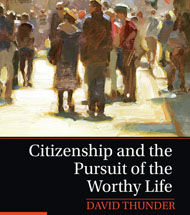"It is possible to have an active public life and remain true to the highest ethical aspirations."
In a book published by Cambridge University Press, researcher of the ICS of the University of Navarra David Thunder analyzes what it means to be a good citizen.
"It is possible to have an active public life and remain true to the highest ethical aspirations." So said David Thunder, researcher of the Institute for Culture and Society (ICS) at the University of Navarra, on the occasion of his new book, Citizenship and the Pursuit of the Worthy Life, recently published by Cambridge University Press.

According to him, this attitude is reflected in the popular notion that "public officials sometimes have to 'get their hands dirty' because of the demands of their positions. In this regard, he mentioned the case of the U.S., "where many people believe that torture can be justified for security reasons.
As a solution, the researcher of project 'Religion and Civil Society' puts forward in the work a holistic view of the citizen, which integrates civic roles and activities in the broadest sense of a person's life.
Political common good and citizens' happinessDavid Thunder emphasized that there is a tendency to isolate the political role from citizens' pursuit of a dignified life. This separation has negative consequences in everyday life," he said, "One of them is that people are less sensitive to the political common good because they perceive it as something external to their own happiness.
To overcome this problem, which manifests itself in "apathy and disaffection for public life", researcher of the ICS proposes in the book his vision of what it means to be a good citizen: "It doesn't just mean voting, paying taxes or taking an interest in local politics; it implies a 'question staff'. There are many ways to be a good citizen, such as owning a business that contributes to the common good in society."
More information about the bookMedia wishing to obtain a copy may contact Rebecca O'Brien at Cambridge University Press at robrien@cambridge.org.





